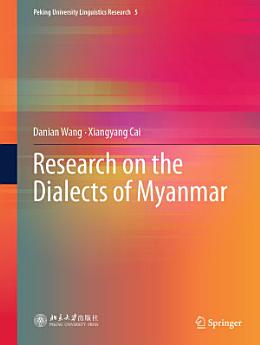Research on the Dialects of Myanmar
Danian Wang · Xiangyang Cai
2025 ജനു · Peking University Linguistics Research പുസ്തകം, 5 · Springer Nature
ഇ-ബുക്ക്
280
പേജുകൾ
reportറേറ്റിംഗുകളും റിവ്യൂകളും പരിശോധിച്ചുറപ്പിച്ചതല്ല കൂടുതലറിയുക
ഈ ഇ-ബുക്കിനെക്കുറിച്ച്
This book provides a detailed description and a cross-dialectal comparison of the major dialects of Myanmar. The fieldwork was carried out under very difficult conditions in Myanmar, which makes this material all the more valuable. Chapter 1 provides phonological and grammatical sketches of 8 major Burmese dialects, while Chapter 2 describes in detail the particular features of their repertoire of initial consonants, rhymes, and tones and remarks on their systems of particles. The Appendices are devoted to detailed lexicons of the dialects, largely based on the first author’s personal fieldwork. Each dialect is exemplified with approximately 1800 forms. Comprising by far the largest corpora of such data ever assembled in one place, the research on tonal systems presented in this book contributes significantly to the tone study of the world’s languages.
രചയിതാവിനെ കുറിച്ച്
Professor Danian Wang joined Peking University as a teaching assistant in 1960, advancing to a full professor. He retired from the University in 2001. Professor Wang started his study of the language of Myanmar as an undergraduate, and with support from the Embassy of P.R.C. in Myanmar, he was able to travel frequently within Myanmar to undertake linguistic fieldwork. His research focuses include the grammar and the developmental history of Myanmar, as well as comparative studies of Tibeto-Burman languages. His research has been published in numerous monographs on the comparative studies of Myanmar and other Sino-Tibetan languages, all written in Chinese.
Professor Xiangyang Cai obtained his Ph.D. degree in Linguistics and Applied Linguistics from the Minzu University of China. He is currently a professor at the Luoyang University of Foreign Languages (Henan), where he teaches Burmese/Myanmar. From 2001-2016, he was an associate professor, and in 2016, he advanced to a full professor. His research focuses on Myanmar language and literature, the languages and cultures in Southeast Asia, and comparative studies of Sino-Tibetan languages. He has published 8 books, including the monograph Miandianyuyan Wenti Yanjiu (The Study of the Linguistics Issues of Myanmar) (in Chinese), as well as more than forty academic articles.ഈ ഇ-ബുക്ക് റേറ്റ് ചെയ്യുക
നിങ്ങളുടെ അഭിപ്രായം ഞങ്ങളെ അറിയിക്കുക.
വായനാ വിവരങ്ങൾ
സ്മാർട്ട്ഫോണുകളും ടാബ്ലെറ്റുകളും
Android, iPad/iPhone എന്നിവയ്ക്കായി Google Play ബുക്സ് ആപ്പ് ഇൻസ്റ്റാൾ ചെയ്യുക. ഇത് നിങ്ങളുടെ അക്കൗണ്ടുമായി സ്വയമേവ സമന്വയിപ്പിക്കപ്പെടുകയും, എവിടെ ആയിരുന്നാലും ഓൺലൈനിൽ അല്ലെങ്കിൽ ഓഫ്ലൈനിൽ വായിക്കാൻ നിങ്ങളെ അനുവദിക്കുകയും ചെയ്യുന്നു.
ലാപ്ടോപ്പുകളും കമ്പ്യൂട്ടറുകളും
Google Play-യിൽ നിന്ന് വാങ്ങിയിട്ടുള്ള ഓഡിയോ ബുക്കുകൾ കമ്പ്യൂട്ടറിന്റെ വെബ് ബ്രൗസർ ഉപയോഗിച്ചുകൊണ്ട് വായിക്കാവുന്നതാണ്.
ഇ-റീഡറുകളും മറ്റ് ഉപകരണങ്ങളും
Kobo ഇ-റീഡറുകൾ പോലുള്ള ഇ-ഇങ്ക് ഉപകരണങ്ങളിൽ വായിക്കാൻ ഒരു ഫയൽ ഡൗൺലോഡ് ചെയ്ത് അത് നിങ്ങളുടെ ഉപകരണത്തിലേക്ക് കൈമാറേണ്ടതുണ്ട്. പിന്തുണയുള്ള ഇ-റീഡറുകളിലേക്ക് ഫയലുകൾ കൈമാറാൻ, സഹായ കേന്ദ്രത്തിലുള്ള വിശദമായ നിർദ്ദേശങ്ങൾ ഫോളോ ചെയ്യുക.







